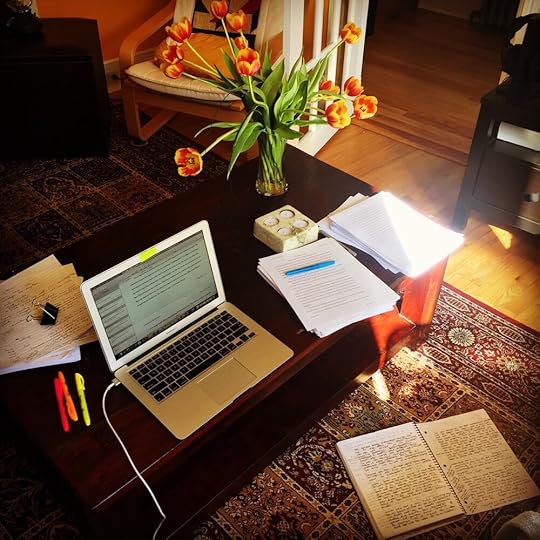Imperfection

One evening in early March my writing group came over for tea and cookies. We usually meet on the university campus, in the dusty closet of a tiny storage room that I joke is The Room of Requirement because it is stuffed to the gills with cast off furniture, books, and plants. But this meeting was special because that night for four hours in my living room, the Port Authority took the first draft of my new novel apart and put it back together. Weak characters, uneven pacing, excess scaffolding, the jumbly ending — they ferreted out all the flaws, asked smart questions, offered opinions on theme, shared insights, things I had not known about my own story. When four fellow writers with their own work and families and projects, read your garbage first draft, magnifying glasses in hand, then share their honest and constructive feedback, it is an immense act of love and generosity. I stayed up long after they left, scribbling notes for revisions. I left the living room exactly as it was, with their print outs of my manuscript and all their notes in situ, to keep the energy alive (and because I’m lazy) and worked right there all the next day, in the spotlight of sun that shone through the window, with the ghosts of their presence still haunting the air.
For a week after that meeting, I was face and ears into my manuscript, pulling nine and ten hour days entirely focused and deep in the zone (I have no small people to look after and a CCA grant, which is how this is possible). Then the pandemic changed everything and for a while, it was impossible to focus and even less possible to work. Even shallow concentration was gone, forget the deep and creative variety. But then mid-way through Week Four, Covid news fatigue set in. I started working again, beginning each day with my book instead of the latest news updates. Focus. Absorption. It came galloping back. Week Five and those nine and ten hour days were now stretching to eleven and twelve. Characters and plot and prose were my first thoughts in the morning, my last thoughts at night. Every writer understands that this level of immersion is fragile and rare. If you can, you must stay under for as long as it lasts. On Friday I submitted a second draft of the manuscript to my agent. HOORAY!
There are flaws, at least one structural issue that I don’t know how to resolve. Definitely a few darlings I haven’t yet murdered. Pace is a problem and the book is approximately seven thousand words too long (but which words? that’s the question). But breaks are important. Distance is necessary for clarity. And without clarity, there’s no hope for revision. Being a writer means getting comfortable with imperfection, knowing that it too is essential to the process.
I joined a webinar on editing recently and came away with this pearl of wisdom: every first draft is a success because by definition, its only job is to exist. To which I add: a second draft need only be better than the first.
Sharon Bala's Blog
- Sharon Bala's profile
- 134 followers



